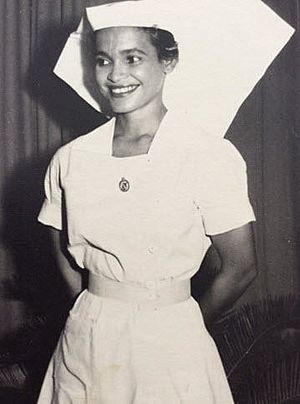MaryAnn Bin-Sallik facts for kids
MaryAnn Bin-Sallik AO is an important Djaru Elder and an Australian expert in Indigenous studies and culture. She was born in 1940. She made history as the first Indigenous Australian to earn a special degree called a doctorate from Harvard University in the United States.
Contents
Early Life and Nursing Career
MaryAnn Bin-Sallik was born in Broome, Western Australia, on November 2, 1940. When she was nine, her family moved to Darwin, Northern Territory. After finishing school, she trained to be a nurse at Darwin Hospital. In 1961, she became the first Indigenous person to graduate from there. For the next 17 years, she worked as a nurse in different Aboriginal communities across the Northern Territory.
Academic Achievements
Starting in Higher Education
In 1975, MaryAnn Bin-Sallik began working at the South Australian Institute of Technology in Adelaide. She became a student councillor for the Aboriginal Task Force (ATF) Program. This made her the first Indigenous Australian to work in a university or college setting. While working, she also earned a diploma in social work in 1979. From 1980 to 1985, she led the ATF program.
Studying at Harvard University
In 1985, she left Australia to study at Harvard University. There, she earned two important degrees. She completed a master's degree in education administration in 1986. Then, in 1989, she finished her doctorate in teaching and learning. This was a huge achievement, making her the first Indigenous Australian to get a doctorate from Harvard.
Leadership in Australian Universities
After returning to Australia, she became a senior lecturer in Aboriginal studies. This was at the South Australian College of Advanced Education from 1989 to 1990. In 1990, she became the head of the School of Aboriginal Studies and Teacher Education at the University of South Australia. Eight years later, she became the dean of the College of Indigenous Education and Research at the same university.
In 1993, she gave a special speech called the 8th Frank Archibald Memorial Lecture. She spoke about how Aboriginal people and universities can work together.
Retirement and Continued Contributions
In 2001, MaryAnn Bin-Sallik moved back to the Northern Territory. She was appointed Ranger Chair and dean of the Faculty of Aboriginal and Torres Strait Islander Studies at Charles Darwin University. She retired in 2008. For her amazing work in Indigenous higher education, she was given the special title of "emeritus professor."
Even in retirement, she continued to help. From 2013 to 2015, she chaired the Vice Chancellor's Indigenous Advisory Council at Charles Darwin University. In 2015, she became the pro vice-chancellor for Aboriginal and Torres Strait Islander Leadership at the University of Western Sydney. She has also been a member of its board of trustees since 2016.
In 2016, she joined the board of Aboriginal Hostels Limited. This group helps Aboriginal and Torres Strait Islander people find temporary places to stay. She also helped with an important investigation by the Australian Human Rights Commission. This investigation looked into the past forced removal of Aboriginal and Torres Strait Islander children from their families.
Awards and Recognition
MaryAnn Bin-Sallik has received many awards for her important work:
- In 2001, she was added to the Victorian Honour Roll of Women.
- She was named Female Elder of the Year at the NAIDOC Awards in 2016.
- In the 2017 Australia Day Honours, she was made an Officer of the Order of Australia (AO). This award recognized her excellent service to education. It highlighted her work as an academic, writer, and leader, especially in Indigenous studies. She was also honored for being a great role model and mentor.
- On March 29, 2017, the University of South Australia gave her an Honorary Doctor of the University (DUniv) degree. This was to recognize her outstanding service to the community.
In October 2017, the University of Wollongong started a new scholarship. It was named the MaryAnn Bin-Sallik Cancer Council NSW Indigenous Health scholarship. This scholarship helps Aboriginal and Torres Strait Islander students who want to study medicine. It was named after her to honor her achievements in health and education.
 | Isaac Myers |
 | D. Hamilton Jackson |
 | A. Philip Randolph |


